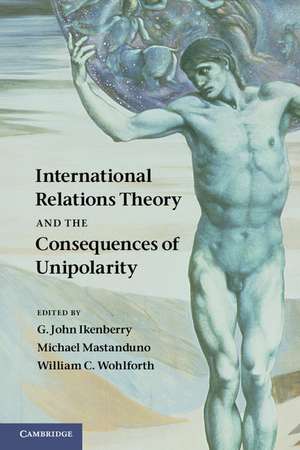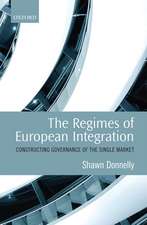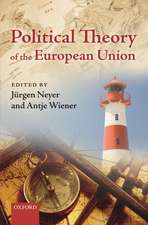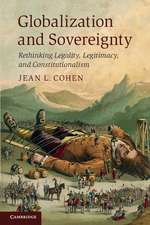International Relations Theory and the Consequences of Unipolarity
Editat de G. John Ikenberry, Michael Mastanduno, William C. Wohlforthen Limba Engleză Paperback – 31 aug 2011
Preț: 286.40 lei
Nou
Puncte Express: 430
Preț estimativ în valută:
54.80€ • 58.60$ • 45.69£
54.80€ • 58.60$ • 45.69£
Carte tipărită la comandă
Livrare economică 17 aprilie-01 mai
Preluare comenzi: 021 569.72.76
Specificații
ISBN-13: 9781107634596
ISBN-10: 1107634598
Pagini: 392
Ilustrații: 8 b/w illus. 5 tables
Dimensiuni: 152 x 227 x 17 mm
Greutate: 0.57 kg
Ediția:New.
Editura: Cambridge University Press
Colecția Cambridge University Press
Locul publicării:New York, United States
ISBN-10: 1107634598
Pagini: 392
Ilustrații: 8 b/w illus. 5 tables
Dimensiuni: 152 x 227 x 17 mm
Greutate: 0.57 kg
Ediția:New.
Editura: Cambridge University Press
Colecția Cambridge University Press
Locul publicării:New York, United States
Cuprins
1. Introduction: unipolarity, state behavior, and systemic consequences G. John Ikenberry, Michael Mastanduno and William C. Wohlforth; 2. Unipolarity, status competition, and great power war William C. Wohlforth; 3. Legitimacy, hypocrisy, and the social structure of unipolarity: why being a unipole isn't all it's cracked up to be Martha Finnemore; 4. Alliances in a unipolar world Stephen M. Walt; 5. System maker and privilege taker: U.S. power and the international political economy Michael Mastanduno; 6. Free hand abroad, divide and rule at home Jack Snyder, Robert Y. Shapiro and Yaeli Bloch-Elkon; 7. The liberal sources of American unipolarity G. John Ikenberry; 8. Unipolarity: a structural perspective Robert Jervis; 9. Unipolarity and nuclear weapons Daniel Deudney; 10. From unipolarity to multipolarity: transition in sight? Barry R. Posen; 11. Sell unipolarity? The future of an overvalued concept Jeffrey W. Legro.
Recenzii
'This brilliant volume is not only the best of its type in a very crowded academic market. Without even trying it knocks the props from out under the now popular myth that the world order is now undergoing a major transformation that is seeing the balance of power tilt from West to East with China - over time - replacing the United States as the single most important player in the international system. A terrific book which demonstrates why good international relations theory makes for sound political judgement about the world in which we all happen to live.' Michael Cox, London School of Economics and Political Science
'Most structural theories have ignored unipolarity and its consequences for international order. Here is a thought-provoking volume that seeks to redress that lacuna by bringing together key scholars to reflect rigorously on the polarity issue. They systematically assess the unipolar system and its manifold consequences. Together they offer several significant hypotheses to scholars to assess structural power even when the unipolar moment appears to be slowly eroding.' T. V. Paul, McGill University
'Most structural theories have ignored unipolarity and its consequences for international order. Here is a thought-provoking volume that seeks to redress that lacuna by bringing together key scholars to reflect rigorously on the polarity issue. They systematically assess the unipolar system and its manifold consequences. Together they offer several significant hypotheses to scholars to assess structural power even when the unipolar moment appears to be slowly eroding.' T. V. Paul, McGill University
Descriere
Discusses the concept of unipolarity and the political implications of US primacy for the patterns of international politics.
















